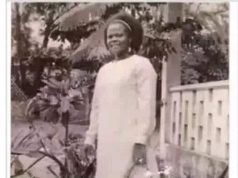How much do you know about Nigeria? We expect every Nigerian to know at least 5 out of the 55. However, if you don’t know, this is an opportunity to learn more about Nigerian history. Find out below:
- The River Niger Bridge at Onitsha was constructed between 1964 and 1965 by Dumez, a French construction company, and cost £5 million.
- Patience Jonathan is one of Nigeria’s most-educated First Ladies, with an NCE, a B.Ed, and Msc from University of Port-Harcourt.
- The highest peak in Nigeria is located in Taraba and is called Chappal Waddi which means “The Mountain of Death”.
- There are over 200 countries in the world and Nigerians live in every one of them.
- The Pidgin word ‘Sabi’ came from ‘Saber’, Portuguese and Spanish for ‘to know’. Both country’s ships traded slaves from the Bight of Benin.
- Katsina College (now Barewa College in Zaria) has produced 5 Nigerian Presidents/Heads of State since it was founded in 1921 in Katsina.
- Ojukwu taught Murtala Mohammed and Ben Adekunle at Regular Officers Special Training School, Ghana. Both ‘fought’ their teacher during the civil war
- At Nigeria’s independence in 1960, there were 41 Secondary Schools in the North and 842 Secondary Schools in the South.
- In 1983, Senator Arthur Nzeribe spent $16.5 million to win a Senatorial seat in Orlu (in Imo State).
- In 1973, the Federal Government of Nigeria considered officially changing the name of “Lagos” to “Eko”; regarding “Lagos” as a colonial name.
- The geographical area now referred to as Nigeria was once referred to as ‘Soudan’ and ‘Nigiritia’.
- Offences punishable by death sentence after the 1966 coup included embezzlement, r@pe and homosexuality.
- MKO Abiola was named Kashimawo (Let us wait and see) by his parents. He was his father’s twenty-third child, but the first to survive infancy.
- Jaja Wachucku was the first person to refer to Lagos as a “no-man’s land” in 1947, provoking a national controversy.
- Jollof rice, chicken breast, served with ice cream, tea, coffee or Bournvita, with full cream milk and sugar: Meal Cost = 50Kobo – Unilag in the late 1970s
- At the point death in 1989, Sam Okwaraji was a PhD candidate and qualified lawyer with an LL.M in International Law (University of Rome)
- When British Bank of West Africa (now First Bank) opened a branch in Kano in 1929, Alhassan Dantata (Dangote’s Grandfather) opened an account depositing 20 camel-loads of silver coins.
- Jaja Wachuku is reputed to have owned the biggest one-man library in West Africa. Balewa sometimes referred to him as “Most Bookish Minister”
- The colonization of Nigeria took more than 40 years to achieve and the territories were integrated by the use of force.
- Yoruba is spoken as a ritual language by the Santeria cult in Carribean and South-Central America.
- Slavery existed in the Nigerian territory before the 15th century and was abolished in the 19th century – 1807 by the British.
- At least 55 women were k!lled in South-East Nigeria, in 1929 when the women forced the Umuahia warrant chiefs to submit to their rule.
- The coinage ‘Supreme Court’ was first used in 1863 by the colonial administration through the enactment of the Supreme Court Ordinance No. II.
- MKO Abiola died suddenly on July 7, 1998, exactly one month after General Sani Abacha died mysteriously on June 8, 1998.
- Agbani Darego was the only one to wear a maillot as opposed to a bikini during the Miss
Universe contest in 2001. - The ‘Ankara’ material is not indigenous to Nigeria. Our indigenous textiles include the Akwete, Ukara, Aso-Oke and Adire.
- Aloma Mukhtar is the first female lawyer from the North and went on to become the first female Chief Justice of Nigeria.
- The area known as Maroko town in Lagos was first a swamp, later sand-filled by the colonial government and served as the first bridge to the Island.
- Esie Museum is Nigeria’s first museum, established in 1945. Once reputed to have the largest collection of soapstone images in the world.
- Aminu Kano formed the Northern Teachers’ Association (NTA) in 1948, the first successful regional organization in the history of the North.
- George Goldie, who played a major role in founding Nigeria, placed a curs€ on anyone who attempts to write his biography.
- In 1996, John Ogbu, a Nigerian Anthropologist firmly advocated for the use of African-American Vernacular to teach in the U.S
- Hause Language indigenous to Northern Nigeria is spoken in 11 African States. Germany, French, U.S., and British International radio stations broadcast in Hausa.
- The surgeon who ‘k!ll£d’ Stella Obasanjo was sentenced to 1 year in prison, disqualified for 3 years and fined €120,000.
- The word ‘asiri’ means ‘secret’ in Hausa, Yoruba, Nupe and Igarra. It also means ‘gossip’ in Igbo.
- Igbo-Ora in Oyo State, Kodinji in India and Candido Godoi in Brazil are the towns that produce the highest number of twin births in the world.
- Bishop Ajayi Crowther, a Yoruba, in 1857 produced a reading book for the Igbo Language and a full grammar and vocabulary of NUPE in 1864.
- The first TV broadcast in Nigeria and Tropical Africa was on October 31, 1959.
- In 1978, a 50Kobo increase (from #1.50 to #2) in the cost of University Students’ meal per day caused the ‘Ali Must Go’ protests.
- Albert E. Kitson discovered coal in Enugu in 1909. This discovery led to the building of Port-Harcourt town in 1912.
- Today, only Nigeria has a larger black population than Brazil. More than 3.5 million Africans were captured, enslaved and transported to Brazil.
- Groundnut pyramids were the invention of Alhaji Alhassan Dantata to stack bags before export.
- In 1967, old traditional ruler, Oba Akran and A. Ademiluyi were jailed for 14 years (7 each) for stealing £504,750 (N2.5b).
- Since 1960, Nigeria has been either ruled by an ex-lecturer/ex-teacher or military man. The only exceptions are Azikiwe and Shonekan.
- If you visited Lagos in 1975, you could spend a day at the Presidential Suite of Federal Palace Hotel for N100, single room for N19.
- The first aircraft to land in Nigeria landed in Kano in July 1925. A British fighter jet flew from Khartoum (present day Sudan).
- In 1895, Koko of Nembe (now in Bayelsa) took 60 white men hostage. When the British refused his demands, more than 40 of those men were eaten.
- The ‘Naira’ was coined by Chief Obafemi Awolowo when he was serving as the Federal Commissioner of Finance.
- Koma Hill (settlement in Adamawa where people lived and practised the killing of twins) was discovered in 1986 by a NYSC corps member.
- The pilot (Francis Osakwe) that flew Ojukwu away from Biafra (1970) was the same pilot that flew Gowon to Uganda (last flight as Head of State).
- In 1986, Shehu Shagari was banned from participation in politics for life. The ban has still not been lifted.
- As the wife of the deputy Head of State (Vice President of Nigeria) in 1984, Biodun Idiagbon personally ran a small ice cream shop in Ilorin.
- Koma Hills (Adamawa State) inhabitants when discovered were observed to eng@ge in the practise of b0rr0wing w!ves among themselves.
- Juju, Dashiki and Okra are words in the English dictionary that originated from ethnic groups located in present day Nigeria.
- Nigeria has more Engl!sh speakers than England.
Wendy Pie’s wall



 ADVERTISE WITH US. Send a Whatsapp message 08070950313
ADVERTISE WITH US. Send a Whatsapp message 08070950313


 ADVERTISE WITH US. Call or send a Whatsapp message 08070950313
ADVERTISE WITH US. Call or send a Whatsapp message 08070950313





